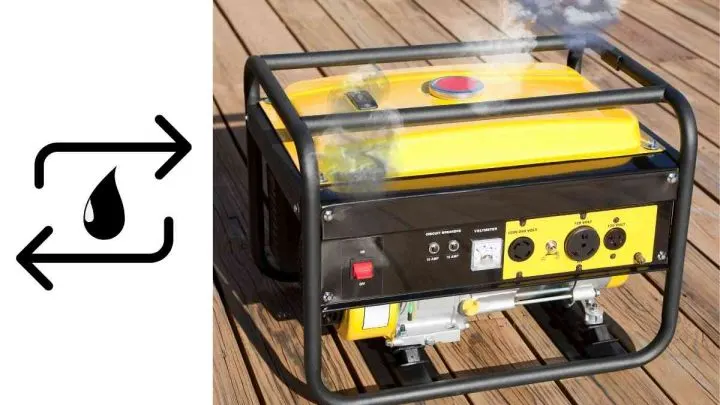It’s happened to the best of us – you change the oil in your generator, and white smoke starts pouring out the exhaust as soon as you restart it. Can this innocent oil change cause this smoking issue?
If your generator starts smoking after an oil change, over fueling could be the culprit. Excess lube can seep into the combustion chamber, causing white smoke. This can occur if you use a higher viscosity oil than recommended. The issue could also be due to a blown head gasket or faulty piston rings.
This article will explore the causes of generator smoking after an oil change and offer some possible solutions. I will also provide several tips on avoiding this problem in the future.
1. Overfilling the Oil
Most people know that overfilling oil in a car is never a good idea. But did you know the same is true for your generator? Overfilling the oil can cause it to seep into the combustion chamber, thereby creating issues.
Overfilling happens when you tilt the generator to fill it up, just like the manual says. You then screw the lid back on while still at an angle. The issue with this method is that your oil pan is not designed to work when tilted. That means you will end up overfilling the generator with oil.
When this occurs, the excess oil leaks into the combustion chamber and gets burned along with the fuel. This causes a lot of smoke and can also damage your generator.
How To Fix
Check your owner’s manual to see how much oil your generator needs. Then, be careful not to overfill it. Wipe up any spillage immediately, and don’t forget to check the oil level before starting the generator.
I also like using a funnel when pouring oil into the machine. This helps me avoid tilting the generator, so I know when it fills up to the correct level. The idea is to have just enough oil in there to fill up the oil tank without overflowing.
2. Using the Wrong Oil
You probably know that different engines require different types of oil. But did you know that using the wrong oil in your generator can also cause smoking issues?
Here’s the thing: if you use a lower viscosity oil than recommended, it can cause problems. The thinner oil flows too easily and can end up seeping into the combustion chamber. That will create white smoke, just like overfilling the oil.
How To Fix
Check your owner’s manual to determine what type of oil is recommended for your generator. If you’re not sure, it’s always better to err on the side of caution by using a thicker oil. That is because thicker oils are less likely to seep into the combustion chamber.
You can also find good information on forums and online communities dedicated to generators. Here, you can ask questions and get advice from other generator owners.
3. Damaged Head Gasket
The first two issues on this list are relatively easy to fix. But if your generator is smoking because of a damaged head gasket, you might be in for a more expensive repair.
The head gasket seals the space between the cylinder head and the engine block. If it’s damaged, oil can leak into the combustion chamber and cause white smoke. It is a serious problem that will require professional attention.
The reasons why your head gasket may fail can vary. It could be a manufacturing defect, an overheating engine, or something else entirely. But one thing is for sure – a damaged head gasket is a serious problem that needs to be fixed as soon as possible.
How To Fix
If you think your head gasket might be damaged, take your generator to a mechanic and have them take a look. They’ll be able to diagnose the problem and let you know what needs to be done to fix it.
If you are handy with tools, you might be able to replace the head gasket yourself. But this is a complex repair that requires special tools and knowledge. I would only recommend attempting it if you are confident in your abilities and have all the necessary tools and quality replacement parts.
4. Damaged Piston Rings
Damaged piston rings are another possible cause of a generator smoking after an oil change. These rings seal the space between the piston and the cylinder wall. Oil can leak into the combustion chamber and cause white smoke if they’re damaged.
Piston rings can suffer damage due to several reasons, but wear and tear are the most common. Over time, the coils become worn and no longer fit as snugly as they once did. This can cause oil to leak into the combustion chamber, creating smoke.
Other causes of damaged piston rings include an overheated engine and a collision. If your generator was in a minor accident, the piston rings might be damaged even if the rest of the engine is fine.
How To Fix
The piston ring repair is a complex job that is best left to a mechanic. Not only do they have the needed expertise, but you can also avoid causing further damage, not to mention unnecessary expenses, due to error. They will be able to diagnose the problem and let you know what needs to be done.
5. Damaged Cylinder Glazing
A damaged cylinder glazing is another common problem with generators that smoke after an oil change. The cylinder glazing is a thin layer of ceramic that coats the cylinder walls. This glazing helps create a smooth surface for the piston to move up and down.
Crystallized carbon can get lodged between the piston and the cylinder glazing, making a trench for the oil to seep through. The oil will leak into the combustion chamber and cause white smoke if this happens.
How To Fix
This is another fix that you want to leave to a mechanic. Some owners understandably want to see if they can fix the problem themselves. However, fixing a damaged cylinder glazing is a complicated process. Leave repairs to the experts. They will be able to diagnose the problem and let you know what needs to be done.
Final Thoughts
I hope this article helps troubleshoot smoking issues with your generator after an oil change. As you can see, there are a couple of different reasons why this might be happening. But with a little bit of investigation, you should be able to figure out the cause and get it fixed.
If you’re still having trouble or would like a second opinion, you can always take your generator to a mechanic. They will be able to help you figure out what’s going on and get your generator running smoothly again.
Recommended Reading

